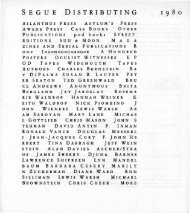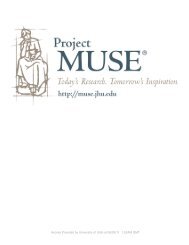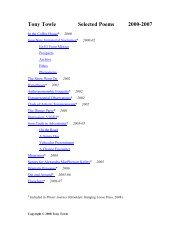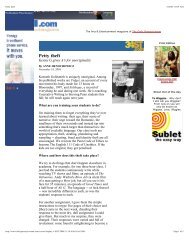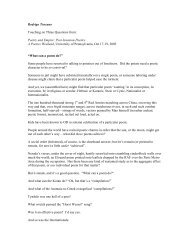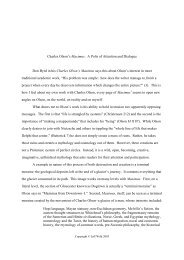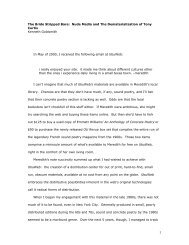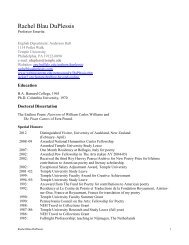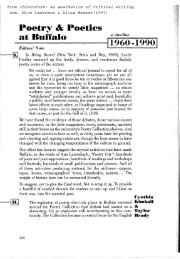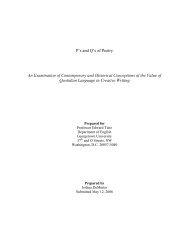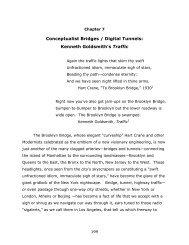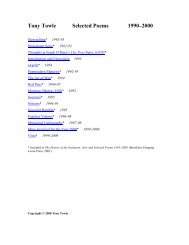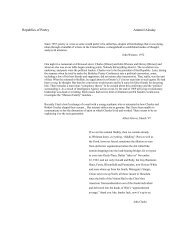Preface - Electronic Poetry Center
Preface - Electronic Poetry Center
Preface - Electronic Poetry Center
You also want an ePaper? Increase the reach of your titles
YUMPU automatically turns print PDFs into web optimized ePapers that Google loves.
characterization of some the structures of the poem would in many critical<br />
circles be a pan, a thumbs down in siskel and eberteze. Yet, under my criteria<br />
and reading practice another, quite successful text surfaces.<br />
I don’t "read" this text so much as allow it to sound out its own cultural<br />
relevance. This is not as passive as it may seem. This sounding invites a text<br />
which is an "imaginary form" which insists no matter how disgruntled I may<br />
become with the way the text sits on the page. Its imaginary form becomes a<br />
discussion between my imagination and the culture’s and the poem’s, a<br />
discussion which is often absent from the page entirely. This absence, or in<br />
effect ascribed culture, is what keeps me. Often this keeping is similar to the<br />
hostage taking as mentioned above, but it remains political in the slippage<br />
between those participants in the discussion. It is this slippage which is the field<br />
of intervention for me. This is the level of engagement. This is personal, it is<br />
ideological, it is social. You mention the social as a field of intervention. So<br />
often, even in O’Hara and Reznikoff, I feel the poem is a description of<br />
something material, a personalization which elementizes some margin running<br />
the gamut from imprisonment (I as the disenfranchized interlocutor of<br />
poetic/cultural condition) to oration (I as arbiter of the imaginary condition).<br />
This field of intervention I often find less entreating, in some ways less the<br />
jouissance, an more an effigy of the entrapped or of entrapment. As to the<br />
materialization of the social field of intervention Wittgenstein said "Psychology<br />
connects what is experienced with something physical, but we connect what is<br />
experienced with what is experienced." I ask what then does poetry connect?<br />
Now is this "blackmail?" (the Barthesian blackmail of theory) I’m not sure. I’m<br />
also not sure what you mean by the poem’s and the theory’s autonomy; I’m not<br />
sure there has ever been such a thing as theoretical autonomy, certainly not<br />
technological autonomy. And when it comes to technology, not much can be<br />
left out. The theoretical apparatus evident here of course is not culturally<br />
bankrupt, certainly it isn’t grammatically bankrupt even if it is sometimes<br />
critically tedious. The fact that the theoretical apparatus no longer provides the<br />
surprise, and then perhaps the strangeness, needs desperately to be examined.<br />
But the condition elemented by the grammar emerges, or maybe the grammar<br />
elemented by the condition emerges. Sure the often "found text" quality of her<br />
work speaks to a possibility of a text made powerless by its automaticness, that<br />
risk that much experience-based art suffers (I’m thinking of Surrealism, Dada,<br />
Minimalism, even some Abstract Expressionism). But her insistence that this<br />
experience never be deflated, or deflected by appropriative gesture, be that<br />
through an acquiescence to theory, to the text, or to the culture, or importantly<br />
to imagination, speaks to the possibility of this text to reveal the often



